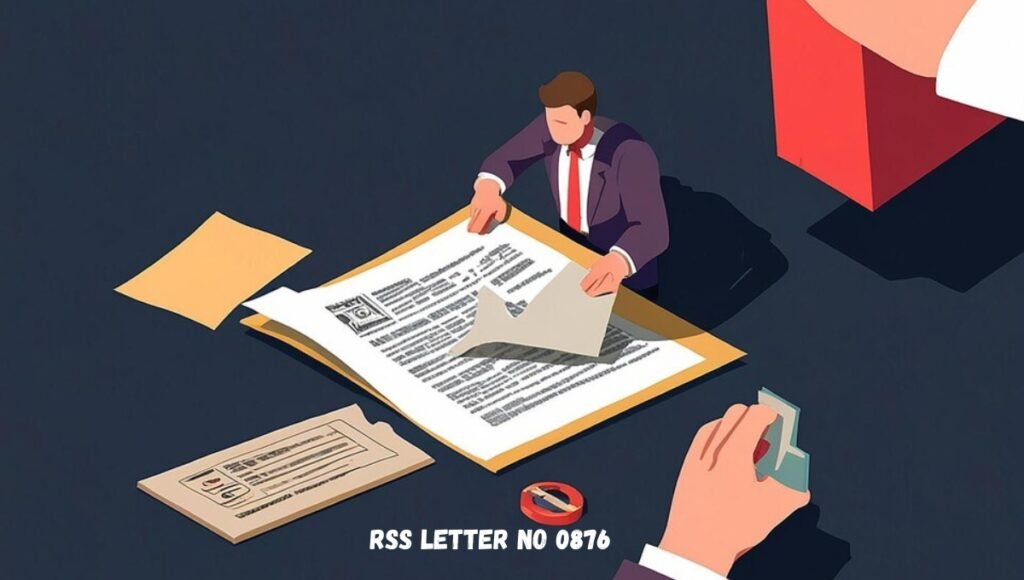Introduction
RSS Letter No 0876 represents a critical communication within the realm of government regulations, compliance, and administrative updates. Such letters serve as formal documents that highlight new regulations, changes in policies, or essential updates to be followed by relevant agencies, organizations, or individuals. Whether you are a business professional, legal expert, or government employee, understanding the nuances of RSS Letter No 0876 is essential.
In this article, we will break down the contents of RSS Letter No 0876, its key elements, the legal and practical implications it presents, and why it holds significance for compliance measures. Additionally, we will explore how to best navigate through such official communications to ensure all guidelines are appropriately followed.
What is RSS Letter No 0876?
RSS Letter No 0876 is an official government correspondence or directive issued as part of a series of letters, commonly addressing specific regulatory concerns, legal requirements, or policy changes. These letters often come with actionable instructions for their recipients, who may be responsible for implementing or responding to new rules or amendments.
For instance, these letters might deal with taxation policies, changes in administrative processes, or modifications in operational protocols for particular industries. In the case of RSS Letter No 0876, the specific nature and the intended audience are essential for determining its scope and impact.
Historical Context of RSS Letters
RSS letters have a long-standing tradition within governmental and administrative frameworks. They serve as one of the main methods through which significant updates or clarifications are delivered to both public and private entities.
Over time, these letters have played a pivotal role in shaping industry standards and government policies. Their importance lies in the fact that they carry the weight of legal and administrative authority, demanding compliance from the recipients. As such, understanding the context in which RSS Letter No 0876 has been issued can help in comprehending its role within a broader regulatory framework.
Key Provisions of RSS Letter No 0876
While the full text of RSS Letter No 0876 might not be publicly available, a general understanding of such letters can help in anticipating its contents. The following are likely components:
- Subject of the Letter: This would typically outline the main issue or policy change being communicated.
- Implementation Timeline: RSS letters often include deadlines for when compliance measures need to be taken.
- Required Actions: These might involve legal filings, administrative adjustments, or procedural updates that need to be carried out by recipients.
- Consequences for Non-Compliance: Most letters include details about potential penalties or actions that might be taken if the recipients fail to comply with the outlined requirements.
- Target Audience: Understanding who the letter is intended for—whether it be businesses, governmental departments, or individual stakeholders—is crucial.
Importance of Compliance with RSS Letter No 0876
Compliance with directives such as RSS Letter No 0876 is not optional—it is mandated by law or regulation. Non-compliance can lead to serious consequences, including legal actions, fines, or other penalties. This is why it is important for recipients of these letters to carefully read and understand all provisions.
Key reasons for compliance include:
- Avoidance of Legal Consequences: Ignoring or misunderstanding the directives can result in legal challenges.
- Operational Efficiency: RSS letters often include updates that are designed to streamline processes or introduce new standards for efficiency.
- Public Image: Organizations that fail to comply with governmental directives risk damaging their reputations.
How to Interpret RSS Letters Like No 0876
Navigating the often complex legalese of an RSS letter can be a daunting task. However, the following steps can assist in breaking down and interpreting these letters:
- Read the Letter Thoroughly: Before taking any action, make sure to understand the full context and details.
- Identify the Specifics: Focus on the key actions required, deadlines, and the consequences for not adhering to the letter’s requirements.
- Consult Legal or Administrative Experts: If the letter introduces changes in law or policy that affect your organization, it may be wise to consult a legal expert to ensure compliance.
- Keep Documentation: Maintain records of any actions taken in response to the letter, including filing proof of compliance if necessary.
The Role of RSS Letters in Governance
RSS letters like No 0876 represent an essential tool for governance. By clearly communicating regulatory changes, they ensure that organizations and stakeholders are kept up to date on necessary actions. They play a vital role in:
- Transparency: Providing clear guidelines ensures that all affected parties are on the same page.
- Accountability: With written directives, the government can hold entities accountable for non-compliance.
- Adaptation to Change: In rapidly changing industries, such as finance or healthcare, RSS letters ensure that all relevant stakeholders remain informed about updates that impact their operations.
Common Challenges with RSS Letters
One of the primary challenges of RSS letters is their complexity. They often deal with legal or technical subjects that can be difficult for laypeople to understand without proper interpretation. Other challenges include:
- Timely Compliance: Recipients may struggle to meet deadlines if they do not fully understand the provisions.
- Ambiguity: Sometimes, the wording of the letter may leave room for interpretation, which can create confusion about how to proceed.
- Resource Constraints: Some organizations may lack the necessary resources to implement the required changes in time.
Best Practices for Responding to RSS Letter No 0876
To ensure that you respond to RSS Letter No 0876 effectively, consider the following best practices:
- Establish a Compliance Team: Larger organizations may benefit from having a dedicated compliance team to address such letters.
- Create a Checklist: Identify all tasks that need to be completed in response to the letter and assign them to the appropriate personnel.
- Monitor Deadlines: Ensure that all necessary actions are completed well before the final deadline to avoid last-minute issues.
- Stay Informed: Regularly review any updates or further communication that might modify the original letter.

Conclusion
RSS Letter No 0876, while specific in its content, reflects a broader pattern of communication within government and regulatory frameworks. Its purpose is to convey important updates and requirements to relevant stakeholders, ensuring that the necessary actions are taken in a timely and efficient manner.
Compliance is essential, not just to avoid legal ramifications but also to maintain operational efficiency and uphold public trust. By understanding how to interpret and respond to such letters, individuals and organizations can better navigate the complexities of regulatory communication.
FAQs
1. What is the purpose of RSS Letter No 0876?
RSS Letter No 0876 is likely issued to communicate regulatory changes, legal requirements, or policy updates to a specific audience, demanding compliance.
2. How can I ensure compliance with RSS Letter No 0876?
Carefully review the letter’s provisions, consult with legal experts if necessary, and ensure all required actions are completed before the deadline.
3. What happens if I fail to comply with the directives in RSS Letter No 0876?
Non-compliance can result in legal penalties, fines, or other enforcement actions depending on the severity of the infraction.
4. Who typically receives RSS Letters?
RSS Letters are generally addressed to government agencies, private organizations, or individuals impacted by regulatory changes or administrative updates.
5. Can I appeal the directives in RSS Letter No 0876?
In some cases, it may be possible to seek clarification or appeal certain aspects of the letter, but this depends on the specific terms and provisions outlined.
6. Are there resources to help me understand RSS Letters better?
Yes, consulting legal experts or compliance professionals can provide guidance on how to interpret and respond to RSS letters effectively.


